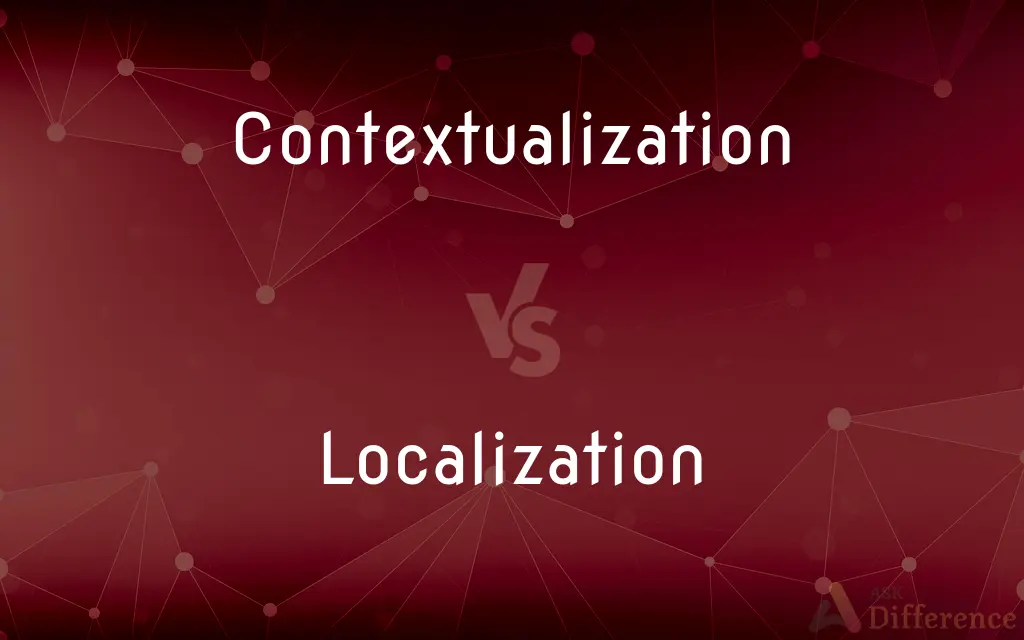Contextualization vs. Localization — What's the Difference?
By Tayyaba Rehman & Fiza Rafique — Updated on March 28, 2024
Contextualization adds cultural relevance to content, making it relatable to a specific audience, while localization adapts content to meet the linguistic and cultural norms of a local market.

Difference Between Contextualization and Localization
Table of Contents
ADVERTISEMENT
Key Differences
Contextualization involves modifying content to include relevant cultural references, ensuring it resonates with a specific demographic or cultural group. On the other hand, localization goes a step further by adapting the content to fit the linguistic, cultural, and technical requirements of a particular geographic region. This can include changes in language, cultural norms, legal requirements, and even design elements.
While contextualization focuses on cultural relevance, ensuring that the content feels relatable and engaging to its intended audience, localization addresses a broader range of adaptations. It involves not only cultural and linguistic adjustments but also technical modifications to ensure that products or services comply with local regulations and are compatible with local technologies.
Contextualization is often used in educational and marketing materials to enhance understanding and engagement by making content more relevant to the audience's own experiences and cultural background. Localization, in contrast, is crucial in global business strategies, where products, websites, and services are adapted for different markets to ensure they are accessible, usable, and legally compliant.
In the process of contextualization, the emphasis is on the subtle nuances that make content more relatable and meaningful, such as local idioms, historical references, or societal norms. Whereas in localization, the focus is broader, encompassing a wide range of elements from language translation to the adaptation of currencies, date formats, and measurement units to align with local conventions.
Both processes are critical in creating content that is not only understandable but also appealing and relevant to the target audience. However, the depth of adaptation varies, with contextualization being somewhat narrower in scope, focusing on cultural and societal relevance, while localization encompasses a comprehensive adaptation to the target market's entire linguistic and cultural landscape.
ADVERTISEMENT
Comparison Chart
Focus
Cultural relevance and relatability
Linguistic, cultural, and technical adaptation
Purpose
Enhance engagement by making content culturally relatable
Adapt products or services for global markets ensuring accessibility and compliance
Scope
Narrower, focusing on cultural nuances
Broader, including language, culture, and technical standards
Application
Often used in education and marketing
Crucial for global business strategy and product adaptation
Adaptations
Cultural references, societal norms
Language, legal requirements, design elements, currencies, date formats
Compare with Definitions
Contextualization
Enhancing relatability through specific references.
Incorporating popular local music into a marketing video.
Localization
Adapting content for different linguistic groups.
Translating a website into Spanish for the Latin American market.
Contextualization
Making content culturally relevant.
Using local folklore in a history lesson to increase student engagement.
Localization
Aligning products with local legal standards.
Modifying a food product’s ingredients to meet EU regulations.
Contextualization
Adjusting messaging to fit cultural norms.
Modifying an ad campaign to reflect local family values.
Localization
Ensuring accessibility in diverse markets.
Adjusting a mobile app’s layout for right-to-left languages.
Contextualization
Ensuring content resonates with a particular demographic.
Tailoring a public health message to resonate with urban youths.
Localization
Customizing technical content for local use.
Changing measurement units in a software application for the UK.
Contextualization
Adapting educational content to a student's background.
Using local examples in math problems.
Localization
Tailoring marketing to fit cultural tastes.
Designing a product package with colors that appeal to Asian consumers.
Contextualization
To place (a word or idea, for example) in a particular context.
Localization
To make local
Decentralize and localize political authority.
Contextualization
The act or process of putting information into context; making sense of information from the situation or location in which the information was found.
Localization
To confine or restrict to a particular locality
Localized the infection.
Localization
To attribute to a particular locality
Sought to localize the origin of the rumor.
Localization
To become local, especially to become fixed in one area or part.
Localization
The act of localizing.
Localization
(software engineering) The act, process, or result of making a product suitable for use in a particular country or region.
Localization
The act, process, or result of adapting translated text to fit a local culture; domestication.
Localization
The state of being localized.
Localization
(algebra) A systematic method of adding multiplicative inverses to a ring.
Localization
(algebra) A ring of fractions of a given ring, such that the complement of the set of allowed denominators is an ideal.
Localization
Act of localizing, or state of being localized.
Localization
A determination of the location of something;
He got a good fix on the target
Localization
(physiology) the principle that specific functions have relatively circumscribed locations in some particular part or organ of the body
Common Curiosities
How does contextualization differ from localization?
Contextualization focuses on cultural relevance and relatability, while localization encompasses a broader range of adaptations, including linguistic, cultural, and technical aspects.
Can you give an example of contextualization in marketing?
In marketing, contextualization might involve using a local celebrity in an ad campaign to increase relatability among a specific cultural group.
How does contextualization enhance learning?
Contextualization enhances learning by making educational content more relevant to students’ cultural backgrounds and experiences, thereby improving engagement and comprehension.
What is contextualization?
Contextualization involves adjusting content to include relevant cultural references to make it more relatable and engaging for a specific audience.
Why is localization important?
Localization is crucial for global market success, as it ensures products and services are accessible, usable, and compliant with local standards and preferences.
Can contextualization affect consumer behavior?
Yes, contextualization can significantly affect consumer behavior by making content more relatable and engaging, leading to higher levels of interest and engagement.
What challenges do businesses face in localization?
Challenges include managing translation quality, understanding local regulations, and adapting to diverse cultural preferences and technical standards.
Is localization only about language translation?
No, localization also involves cultural, legal, and technical adaptations to ensure a product or service fits the local market's needs and preferences.
What role does localization play in global business?
Localization plays a critical role in global business by enabling companies to adapt their products and services for different markets, ensuring they are accessible, relevant, and compliant with local regulations.
How can contextualization improve user experience?
Contextualization improves user experience by making content more personally relevant and engaging, leading to a deeper connection with the material.
Are there tools to aid in localization?
There are various software tools and platforms designed to help with translation, cultural adaptation, and technical adjustments in the localization process.
What are the key components of localization?
Key components of localization include language translation, cultural adaptation, legal compliance, and technical adjustments for the target market.
How do companies determine the need for localization?
Companies assess market research, legal requirements, cultural differences, and customer feedback to determine the extent of localization needed for different markets.
Does localization require local expertise?
Yes, effective localization often requires input from local experts to ensure accurate and culturally appropriate adaptations.
Why might a business choose not to localize?
Businesses might avoid localization due to high costs, a lack of market potential, or the universal appeal of their product or service without significant adaptation.
Share Your Discovery

Previous Comparison
Cortex vs. Pith
Next Comparison
Fasting vs. PastingAuthor Spotlight
Written by
Tayyaba RehmanTayyaba Rehman is a distinguished writer, currently serving as a primary contributor to askdifference.com. As a researcher in semantics and etymology, Tayyaba's passion for the complexity of languages and their distinctions has found a perfect home on the platform. Tayyaba delves into the intricacies of language, distinguishing between commonly confused words and phrases, thereby providing clarity for readers worldwide.
Co-written by
Fiza RafiqueFiza Rafique is a skilled content writer at AskDifference.com, where she meticulously refines and enhances written pieces. Drawing from her vast editorial expertise, Fiza ensures clarity, accuracy, and precision in every article. Passionate about language, she continually seeks to elevate the quality of content for readers worldwide.















































